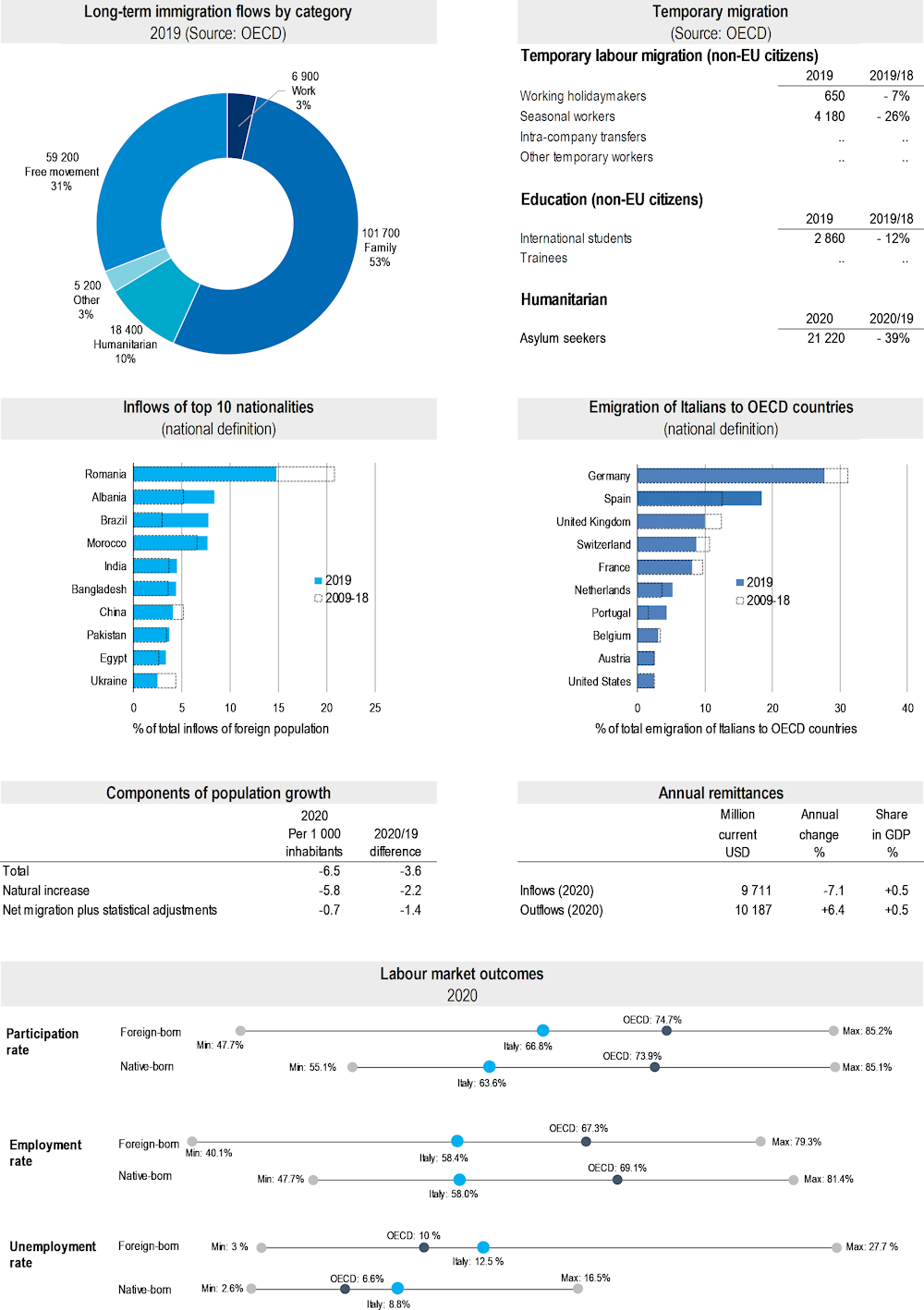In 2019, Italy received 191 000 new immigrants on a long-term or permanent basis (including changes of status and free mobility), ‑14.8% compared to 2018. This figure comprises 30.9% immigrants benefitting from free mobility, 3.6% labour migrants, 53.2% family members (including accompanying family) and 9.6% humanitarian migrants. Around 2 900 permits were issued to tertiary-level international students and 4 800 to temporary and seasonal labour migrants (excluding intra-EU migration). In addition, 174 000 intra-EU postings were recorded in 2019, an increase of 130% compared to 2018. These posted workers are generally on short-term contracts.
Romania, Albania and Brazil were the top three nationalities of newcomers in 2019. Among the top 15 countries of origin, Albania registered the strongest increase (4 200) and Nigeria the largest decrease (‑12 000) in flows to Italy compared to the previous year.
In 2020, the number of first asylum applicants decreased by ‑39.4%, to reach around 21 000. The majority of applicants came from Pakistan (4 900), Bangladesh (2 300) and El Salvador (1 100). The largest increase since 2019 concerned nationals of Bangladesh (900) and the largest decrease nationals of Pakistan (‑2 400). Of the 41 000 decisions taken in 2020, 28.4% were positive.
The major developments in migration policies in 2019‑20 were related to the change of government in the summer of 2019 and to COVID‑19. They were: reform of security decrees approved in 2018 and in the first part of 2019; the regularisation of irregular migrant workers present in Italy before 8 March 2020; and changes to the yearly quota decree for seasonal and non-seasonal workers. In addition, the first National Plan to Address Labour Exploitation and Illegal Recruitment in agriculture was adopted in 2020. This plan works on prevention, protection, enforcement and remedies through specific actions. While covering all agricultural workers, migrants – especially irregular and those in need of protection – are a priority category.
Reform of the two “Security Decrees” passed in 2018 and 2019 restored a single system for the reception of applicants and holders of protection. The single system entrusts reception and integration to local authorities and restores a third protection status in addition to the right to asylum and subsidiary protection. The reform also prevents expulsion or rejection of a person to a State if there are well-founded reasons to believe that such action violates the right to respect for one’s private and family life.
The number of residence permits which allow conversion into a permit for subordinate work was increased, to include not only study reasons but also permits on grounds of special protection, calamities, elective residence, sports, artistic activities, religious reasons, awaiting citizenship, and assistance for minors.
The 2020 quota decree set a maximum admissions quota of 30 850 workers, 18 000 of which are reserved for seasonal work. As a pilot, aimed at reducing the risk of illegal intermediation, 6 000 applications for seasonal permits may be filed by employers’ associations. Among the remaining non-seasonal workers, 6 000 were allotted to certain sectors (transport of goods, hospitality and tourism and construction). Nationalities eligible include those from countries with which Italy has an agreement for co‑operation on migration issues. The remaining quota is largely reserved for various status change and special categories.
The maximum duration of the procedure for granting Italian citizenship to a foreigner has been reduced to 24 months.
Although the Minister of the Interior may still restrict or prohibit the transit and stopping of rescue ships in Italian waters, this may not apply in the case of rescue operations immediately communicated to the competent Maritime Rescue Co‑ordination Centre and carried out in accordance with the instructions of the competent authority for search and rescue at sea.
In response to COVID‑19, new measures allowed the possible regularisation of foreign workers, present in Italy before 8 March 2020. Employers may issue new contracts with irregularly resident citizens of non-EU countries in the sectors of agriculture, fisheries and related activities or in domestic work or caregiving services. They receive a renewable one‑ or two‑year residence permit, depending the duration of the job contract. A six‑month temporary residence permit could be requested by those currently employed in those sectors, or unemployed whose residence permit expired after October 2019 and who were employed in the same sectors before November 2019. The temporary permit may be converted into a residence permit for work reasons. 207 000 applications were received from employers (85% for domestic work and 15% for agriculture) and 13 000 from unemployed irregular migrants by the deadline in August 2020. Processing of applications was slow to start; by 1 June 2021, 11 000 permits had been issued, with 86% still pending.
For further information:

